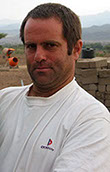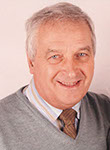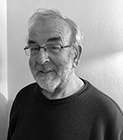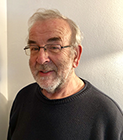The Charity is run by a small Board of volunteer Trustees which meets regularly to oversee the governance, legal, financial and all operational aspects of the Charity’s mission and produce an Annual Report in accordance with demands of the Charity Commission and HMRC. A copy of the current Annual Report can be downloaded here.
Drilling for water, caring for life
Nehemiah Construction Ministries U.K.
Registered Charity No: 1129983
Who are we?
Drilling information
Nehemiah Construction Ministries U.K is a registered limited non-profit making company compliant in Kenya (CF/2012/76350) and is a qualified water resource contractor licensed by The Ministry of Water and Irrigation Ref. No. WD/WC/2039 and Certificate No. MTAC – 1270/16.
Meet the Trustees of the charity
Will Symons
Will was born in London but spent his teenage years growing up in Cheshire. During his working life he has been employed in commercial, charity and public sector organisations in various supervisory and management positions. He worked for the Yorkshire Bank before studying for an MBA, then was employed by the Citizens Advice Bureau before becoming a secondary school Business Manager and then running a Facilities Management contract. He is currently a Practice Manager at a City Centre Doctors Practice.
Will has been involved in his local community for many years, he was a school governor for 18 years and is on the boards of the local CAB and another charity in addition to Nehemiah Construction Ministries U.K. He has known Les for over 20 years and John for about 15 years. He has travelled to Kenya with them to see at first hand the needs there. Will has been married to Jane for 23 years and has two boys. They attend Elim City Church in Peterborough.
Les Saunders
Les is in charge of the construction for the trust and was born in St. Leonards on Sea in Sussex. He lived in Kent for a number of years before moving to Peterborough in 1985. He left school at the age of 16 and trained to be a carpenter before joining the Air Force where he served for two years. He learned his many practical skills in his teenage years by working alongside his father. He is a superb carpenter as well as kitchen and bathroom fitter and has worked with John Harrison on many occasions.
Les was brought up in a family with strong Christian values who always had an “overseas missions” outlook. For many years his mother and father have completed short term missions trips to Mumbai in India. His sister has completed many long term missions projects in Italy and the Philippines.
At the age of 10, Les was given a prophecy which said that one day he would serve God in Africa. That prophecy came true in 1999 when he went to Kenya in East Africa. Since then he has been to Kenya numerous times always offering himself as a willing volunteer. In 2003 he spent 6 months there with his family. Les is married to Pauline and they have four children and one grandchild. They attended Elim City Church in Peterborough. Having spent 2 years living in Kenya Les and Pauline are back in Peterborough Les is currently heading up the drilling operation in Kenya and visits Kenya regularly.
John Harrison
John is Chairman of the trust and was born in Bradford, West Yorkshire, UK. John has been married to Ruth for 50 years. They have a son and a daughter and three grandchildren. He was the Pastor of a number of churches in Wales (Port Talbot), Scotland (Clydebank) and England (Lowestoft, Reading and Peterborough).
During those years, he was also Youth Pastor and Superintendent Minister. He headed up an annual Youth camp for over 10 years and was for many years the “Gang Leader” of the “Good News Gang”, a nationwide Christian children’s club. He officially retired in 2011. He continues his practical mechanical and evangelistic work with the Trust and has visited Kenya on numerous occasions. John and Ruth live in Somerset.
Richard Morrison
Richard is married to Fran and they have with 2 magnificent sons Rob and Joe and 2 delightful grandchildren Sam and Amelie. Although now ‘actively retired’ in Leicester, they are well-travelled with their work – latterly managing a charity working with disadvantaged young people in Scotland, starting an educational city-wide trust operating in primary and secondary schools after a period developing young leaders through informal small groups in schools across East England. These enterprises followed a period as a church Youth Work Director, a YMCA Programme Director / Hotel Warden and 5 years as an Insurance Company Risk Assessor.
Richard was born in Wolverhampton but as a child lived in Germany and Egypt. He is still trying to communicate in French, almost stopped playing guitar, he has collections of detective novels with philosophical and theological books. He is involved in his local village church and with Gideons UK. He has been a Trustee with Nehemiah Construction Ministries U.K for 3 years. He would never had believed life would be so full!
Kenya
Kenya is bordered by Ethiopia to the north, Somalia to the northeast, Tanzania to the south, Uganda to the west, and Sudan to the northwest, with the Indian Ocean running along the southeast border. It is named after Mount Kenya, the second highest mountain peak of Africa. Turkana is an isolated region of Northwest Kenya that covers approximately 70,000 square miles. Located in a valley between two large mountain ranges, the climate is hot and the land is semi-arid and desert. It has been described as “a horizon-less frying pan of desolation.” With a population of somewhere between 250,000 and 340,000, the Turkana are Kenya's third-largest tribe, as well as the country's second-largest group of sheep/cattle farmers, after the Masai. The Turkana are nomadic and move constantly, chasing the clouds in the hope of rain and the small patches of freshly sprouted vegetation which it gives. As rainfall is uneven and unreliable, this can only be accomplished by the tribe fragmenting into small groups, for what there is of pasture land is insufficient to feed a large number of livestock, as well as people. The land for the most part, is a parched desert plain strewn with rusty sun-baked rocks, coarse sand and small outcrops, and some low and equally barren hills. The climate is dry and often blisteringly hot, and the paltry annual rainfall of around 250-300mm prevents any but the hardiest of desert plants from growing: low thorn bush and seasonal grasses. In any case, rainfall patterns are unreliable and patchy; short rains during April and the long rains from June to early September, but in many years the rainfall is scant or fails altogether. Turkana is Kenya’s third-poorest region. With more than half the local economy relying on agriculture and per capita income less than 1/5th of Nairobi’s. Around 55% of Turkana residents live below the poverty line.
In September 2019, Tullow Oil – an American international company - signed an agreement for the development of oil reserve discoveries in the South Lokichar Basin near Lake Turkana. These were discovered in 2012 and are estimated at 560mn bl. Oil is planned to be transported from the 433-hectare oil production and processing facility to Lamu port in North Kenya via an 820km pipeline and production will likely start in late 2023. Tullow is finalising a water supply agreement to pump water from neighbouring West Pokot County to South Lokichar. Under a petroleum bill in March 2019, central government will receive 75% of state oil revenues, local government will get 20% and the communities living where oil is located will take 5%. The revenue sharing agreement between Kenya and the oil companies has not been disclosed publicly at the request of the government.
“Land disputes will most likely always be there – Turkanans are pastoralists that need community and to graze cattle. Finding common ground between the traditional way of life and the nascent oil industry has proved to be difficult, particularly where the local population has yet to see the much-await revenues from oil.” Patricia Vasquez, an extractive industries expert working in East Africa.
“Most of the pipeline will be laid along community land. We don’t know if any compulsory (land) acquisition will be required- we do not expect many kilometres (of the land on which the pipeline will pass) to be owned by individuals, corporations or even counties.” Mark MacFarlane, Tullow’s executive VP for East Africa.
“At the moment, I could see that this enterprise would affect the population and it’s growth with the necessary development of supporting services in a 50km corridor around the facility and alongside the pipeline – away from where we are operating, although the upgrading of the road from Kitale north has been very beneficial”. Les Saunders, Nehemiah Construction Ministries U.K Operations Manager
More recently, drilling has taken place in the Pokot region of the north-west Kenya. Pokot has a similar climate and conditions as Turkana. Click here to check out these locations
A beginner's guide to drilling operations.
Drilling normally starts with a drag bit to drill through the overburden (the soft stuff). This may be only a few meters deep or could extend many meters with either air or mud drilling to clear the hole until rock reached.
The drag bit and rods are then removed and the hole is cased with a temporary steel casing to support the hole.
The drag bit is then replaced with an air driven ‘down the hole’ hammer bit to drill through the rock to the required depth or until sufficient water is obtained. The hammer is smaller than the drag bit enabling it to pass through the temporary casing.
Once the water level has been hit, if the hole is not stable, a gravel and plastic casing is placed around the hole. Sometimes it is necessary to drill further to develop the water pressure. The air hose flushes the water until it is clean. To stop intruding surface water, the top of the casing is cemented in and the holes if capped with concrete, suitable for an installation of either a hand pump (in rural areas or for electric or solar panel pumps).
A water sample then is sent off for purity testing and the users are instructed in usage and pump maintenance.
A brief history of Nehemiah Construction Ministries U.K.
Two friends, Les Saunders and John Harrison visited Kenya a number of times from 1996 to 2008 and had always been involved in construction, particularly in the arid, semi desert region of Turkana. On every visit to Kenya, and in particular, Turkana and Pokot, they were always confronted by the single, biggest need – the people were desperate for clean water! It was in 2008 that their vision to supply clean water was birthed and they shared this vision with a few other friends. The charity, known as Nehemiah Construction Ministries U.K. was formed.c Les, John, Brian, Kenny & Will became the first volunteer Trustees of the charity. Soon the Charity was registered with the Charities Commission, Companies House and HMRC. In 2009 the Charity embarked on a specific project to raise money for a new rotary drilling rig and support vehicle, costing in the region of £130,000 (eventually rising to nearly £200.000), to enhance the work already being carried out by many charities in Kenya. The fundraising began when a local youth leader (Chedzy Wild) mobilised his youth group (More than RaW) to fundraise. During that year, they were responsible for raising approximately £35,000. Their efforts inspired many other people in different parts of the UK to give to this important project – senior citizens groups in Hastings and Peterborough, students at Brighton College, churches in Peterborough, plus gifts from individuals from all over the UK. An anonymous gift of £10,000 was also received. In addition, some substantial gifts were received from four charitable trusts.
The result was that a new rotary drilling rig and support vehicle were ordered, and then manufactured by PWF Engineering in Biggleswade, who have manufactured in excess of 200 rigs, support vehicles and associated equipment for use in Africa. This new rig and support vehicle was the first that they have supplied to Kenya. The rig is mounted on a low mileage ex-British military Bedford TM 6x6 truck and similarly the support vehicle is a low mileage Bedford TM 4x4 truck. Both vehicles are compatible in many ways and are ideally suited to working in areas not accessible by road. The use of these vehicles is also a considerable cost saving. They were however over the 8 year old rule for importation of vehicles into Kenya. In 2009, before starting this project an informal meeting was had with KEBS in Nairobi to determine whether it would be possible to obtain permission to import the two vehicles into Kenya. After a positive response, the fundraising and manufacture of the equipment could proceed. Click here for a copy of the technical specification of this equipment. The drilling rig and support vehicle were transported to Tilbury docks and then shipped to Kenya in early 2015. On arrival in the Port of Mombasa, it took some time before they could be released and then driven north west to Kitale in north west Kenya (Virtually the whole width of the country). They are drilling and refurbishing boreholes in Kenya.
Les is the “Operations Manager” in Kenya. John is Chairman of the Trustees. Brian & Will have been joined by Richard and together they are the Trustees. The Charity still raises money in the UK for the specific purpose of helping the people of Turkana and Pokot, Kenya. It is still a not-for-profit charity.
Living Water
Two thousand years ago, a man sat by a water well, asked a woman for a drink and began to talk to her about “Living Water”. He quickly mentioned that if people drank of the water from the nearby well, they would eventually get thirsty again. Then He made a very bold statement “whoever drinks of the water that I shall give him will never thirst”. That statement is backed up by another one “If anyone is thirsty, let him come to Me and drink”. That man was Jesus Christ, the Son of God, and what He said are two of the most amazing statements in the Bible, Gospel of John Chapter 4, verse 13 and 14 and Gospel of John Chapter 7 and verse 38.
What did He mean? What was He getting at? Did He have His own drilling rig? Did He own a reservoir? Did He have ready access to His own water well?
Jesus was simply stating that everyone needs water for Life to exist naturally - but they also needed the water of Life to live fully and eternally. He knew then and we know now that you can’t survive for long without water. The stark reality of His statements is that mankind has no hope of eternity without the ‘Living Water’, which is Jesus. We all know that water is satisfying and thirst quenching and we, the Trustees of Nehemiah Construction Ministries U.K., have our own individual experiences of being satisfied in their spirit by Jesus, the Living Water. Being the Son of God, He became the perfect remedy for completely dealing with the sins of mankind by His sacrifice on the Cross - and anyone who believes in Him will not perish, but will have everlasting life. He satisfies us by coming into our lives, assuring us of God’s forgiveness when we have repented of our sins, bringing His love, joy and peace and giving us the daily assurance of eternal life.
What Jesus has done for us, motivates us to help our fellow human beings of whatever, race, tribe, culture or religion by providing natural satisfying clean water – freely, for this life and informing them of Jesus Christ, the living water who will satisfy them spiritually for eternity. These are our values and mission: they direct our behaviour and reactions in every situation.
In the last chapter of the Bible, Revelation Chapter 22 and verse 17, the invitation from Jesus still applies today “Come! Whoever is thirsty, let him come and take the free gift of the water of life”.
Frequently asked questions
1. Why do you use the name Nehemiah?
A:Nehemiah was a man in the Old Testament of the Bible who initiated a re-building programme for his fellow man. He saw a great need
and did something about it. He is
our role model in the work we do.
2. How much money given to the charity is spent on administration?
A:Less than 5% of the money given into the general funds is used on administration. Paying for things like newsletters, printing, upkeep of the website etc.
3. Why do you work only in Kenya?
A:Two of the Trustees, John Harrison and Les Saunders began work in the Turkana region of north west Kenya in 2001 and identified it as one of the poorest and driest places in Africa.
4. Do you propagate Christianity?
A:Yes we do. You can find more information above in the Living water section of the information page.
5. How long has your charity been established?
A:It has been registered with the Charity Commissioners since 4 June 2009, although two of the founder Trustees have been doing charity work in Kenya since 1996.
6. Does the charity fund the construction trips to Kenya?
A:Any personnel that go on such trips sponsor themselves. Materials for
construction, basic subsistence and travel within Kenya is funded by the charity.
7. What is the long term goal of the charity?
A:(a) providing access to clean water.
(b) providing food and shelter.
(c) spreading the good news about Jesus Christ.
8. Do you publish annual accounts?
A:Yes, on the Companies House Website which we are required to do by law.
9. How much money does the charity need annually?
A:There is no minimum or maximum target. As long as people generously give finance we will do the work of providing clean water and meeting the basic needs of the villagers.
11. How can I fundraise for the charity?
A:If you would like to fundraise for the charity please contact us via the contact us page. We will be able to help with publicity, give you ideas of what you can do and help in any way we can.
10. How can I donate to Nehemiah Construction Ministries U.K.?
A:Use any of the Virginmoneygiving buttons on the bottom of every page. You may wish to send a one off donation to the address on the contact us page or contact us direct if you would like to donate regularly.













